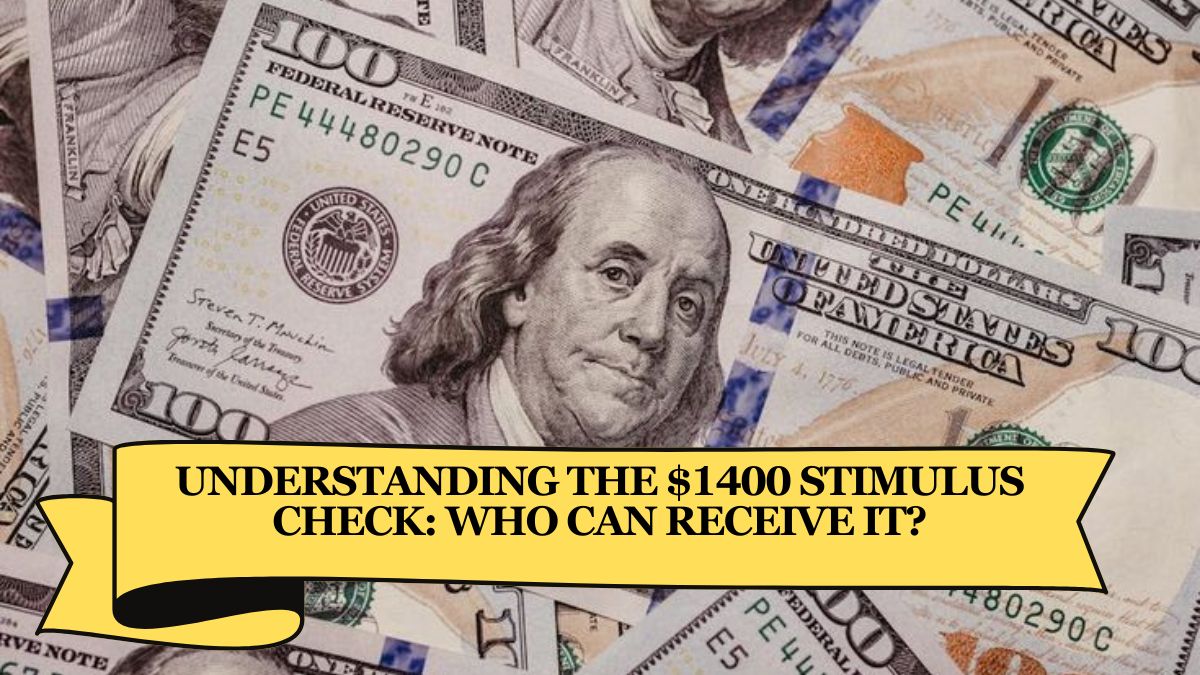During the COVID-19 pandemic, many Americans faced financial struggles. The U.S. government introduced stimulus checks, officially known as Economic Impact Payments, to help people during this tough time. One of the main stimulus checks, worth $1400, was given to eligible individuals to provide financial relief. Even in 2024 and 2025, the IRS continues to issue these checks to people who did not receive the full amount in earlier rounds. However, some people may have difficulty claiming or receiving the $1400 check due to eligibility issues. In this article, we’ll explain who is eligible for the stimulus payment, why some people may not receive it, and how to ensure you get the help you need.
What Are the $1400 Stimulus Checks?
The $1400 stimulus check is a payment provided by the U.S. government to help individuals and families manage the economic challenges caused by the COVID-19 pandemic. The check is also known as the Economic Impact Payment or Recovery Rebate Credit. This payment was aimed at providing financial relief, especially for those who lost income or faced unexpected financial hardships during the pandemic.
Who Is Eligible for the $1400 Stimulus Check?
Not everyone is automatically eligible to receive the $1400stimulus check. The IRS has set clear criteria to determine who qualifies. Below are some of the key requirements:
1. Valid Social Security Number (SSN)
A valid Social Security Number (SSN) is a must for eligibility. Without an SSN, you will not be able to receive the payment. This requirement is in place to ensure that the stimulus checks are sent to legal U.S. residents or citizens.
2. Income Limits
Income limits play a big role in deciding who gets the full payment. The IRS has set certain income thresholds:
- Single filers: If your adjusted gross income (AGI) is $75,000 or less, you can qualify for the full$1400check. If your income exceeds this limit, your payment will be smaller, or you may not receive any payment at all.
- Married couples filing jointly: For couples, the combined AGI must not exceed $150,000. Couples with incomes above this limit will likely see a reduction in their payment.
- Heads of Household: People who file as heads of household must have an income of $112,500 or less. This category often includes single parents or individuals supporting dependents.
3. Residency Status
Non-resident aliens, people who are not U.S. citizens or permanent residents, are not eligible for the stimulus check. In addition, individuals without a green card or proof of substantial presence in the U.S. will not qualify.
4. Dependents
If you have dependents, you might be eligible for additional payments. For example, parents with children under the age of 18 may qualify for extra amounts. However, these payments can vary depending on your tax filing status and the number of dependents you claim.
Why Might Some People Not Receive the $1400 Check?
While many people are eligible for the $1400 stimulus check, some may not receive it due to several reasons. Let’s look at the common issues:
1. Inaccurate or Missing Information
If you provided incorrect information on your tax returns or failed to update your details with the IRS, it could delay or prevent the payment from being issued. It’s important to ensure that your Social Security Number, income, and filing status are accurate when you submit your tax returns.
2. Higher Income
If your income exceeds the income limits set by the IRS, you may not receive the full $1400 stimulus check. In some cases, if your income is high enough, you may not receive any payment at all.
3. Not Filing Taxes
Some people may not file taxes, especially if they don’t meet the income threshold. In this case, the IRS may not have enough information to send the payment. It’s important to file your taxes even if you don’t owe money, so the IRS knows how to contact you and send the stimulus check.
4. Issues With Dependency Claims
People who are claimed as dependents by someone else may not be eligible for the $1400 stimulus check. If you are claimed as a dependent on another person’s tax return, you won’t get a check, even if you live alone or work.
5. Non-Residents
As mentioned earlier, non-resident aliens, or people without a valid Social Security Number, are not eligible. People who live abroad or are not considered U.S. residents will not receive the stimulus check.
How Can You Ensure You Receive the $1400Stimulus Check?
To ensure you receive the $1400 payment, follow these steps:
- File Your Taxes: Make sure you file your taxes on time, even if you don’t owe money. This helps the IRS confirm your eligibility for the payment.
- Update Your Information: If you’ve moved or changed your bank account, update your details with the IRS. If you don’t receive a check via mail, you may be eligible for a direct deposit payment.
- Check Your Status: You can check the status of your payment on the IRS website. If there are any issues, the IRS can help you resolve them.
The $1400 stimulus check has been a vital financial support for many during the economic challenges brought on by the COVID-19 pandemic. However, eligibility is not automatic, and it’s important for individuals to meet certain criteria, such as income limits and residency requirements. Those who don’t meet these standards may not receive the full amount, or any payment at all. To ensure you get the help you need, make sure your personal and tax information is up-to-date, and if you haven’t received your payment, check the IRS website for updates.
The IRS continues to send out payments in 2024 and 2025, so if you were eligible but missed the previous rounds, now is the time to make sure you claim your rightful share. By staying informed and taking the right steps, you can ensure that the $1400 payment helps you during these difficult times.
Must Visit: California State Online

